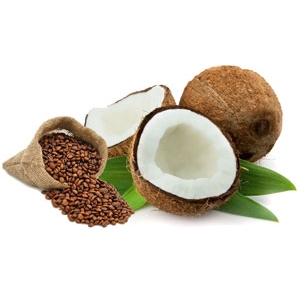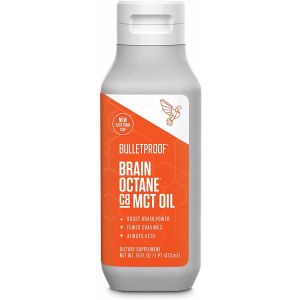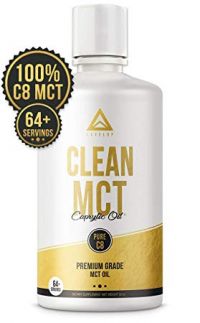“Bulletproof coffee” is black coffee that contains butter or coconut oil and no sugar or creamer. It is used to boost energy and workouts in the morning, particularly among people following ketogenic or other low-carbohydrate diets. MCT oil, often derived from coconut oil, is a particularly beneficial coffee additive.

What is Bulletproof Coffee?
Bulletproof coffee is a popular new workout and weight loss trend, particularly among people who are following a ketogenic or other low-carbohydrate diet. It is made by adding butter or coconut oil to straight black coffee, without any extra carbohydrates that come from sugars or creamers. Many people use bulletproof coffee as a breakfast replacement, as the caffeine and fats provide energy to start the day without the need to consume carbs.1
Fitness-minded individuals also use bulletproof coffee to give themselves an energy boost for a higher-intensity morning workout on an empty stomach, with the idea that it accelerates the burning of fat stored in the body during this exercise. As a bonus, coffee beans are a good source of antioxidants.2

How Bulletproof Coffee Fits into a Ketogenic Diet
Ketogenic diets have long been used to manage certain types of epilepsy, but recently have gained popularity as a weight loss diet. The principle of a keto diet is that you consume most of your daily calories in fats and lipids, with a moderate amount of protein, with very little coming from carbohydrates (less than 50g of carbs per day). This causes your body to enter a state of ketosis, where your cells switch from burning sugars for energy to using fat, including that stored in your adipose tissues.3
Many followers of the ketogenic diet have turned to bulletproof coffee for their morning pick-me-up. Adding coconut oil to coffee gives it a more interesting flavor, plus makes it richer and more satiating for longer periods of time. Coconut oil serves as a carb-free alternative to traditional coffee creamers which often contain lactose and other sugars. The energy from the caffeine enables a higher-intensity workout, which will burn fat and strengthen muscles quicker.1,2


Health Benefits and Possible Risks of Coconut Oil
Compared to other oils and fats, coconut oil has a relatively high content of medium-chain triglycerides (MCTs). Most of the other types of oils you eat and cook with are predominantly composed of long-chain triglycerides (LCTs). The smaller MCTs are quickly converted into high-energy ketones rather than getting stored in fat deposits in the body.4 Though research is limited, initial evidence suggests that coconut oil may have anti-inflammatory effects and be neuroprotective.5
Coconut oil may be healthier than butter and other animal fats, but has a higher saturated fat content than other plant-based oils. It tends to raise blood cholesterol levels, including low-density-lipoprotein (LDL) or “bad” cholesterol. This poses a potential risk for cardiovascular disease.6


Coconut Oil vs MCT Oil
Essentially, MCT oil is a component of coconut oil. About 63% of coconut oil is MCTs, while the rest is LCTs and other types of fats. The MCT oil that you can purchase at the store is usually produced industrially in a laboratory or manufacturing plant, where the MCTs are distilled from coconut or palm kernel oils.4 If buying MCT oil, make sure to check the labeling. Sometimes companies will try to pass off coconut oil as MCT oil, even though it is not pure and contains other types of fats.
Most of the health benefits attributed to coconut oil come from its MCT oil content.6 Thus, pure MCT oil can provide those benefits to a greater extent. MCT oil also makes you feel fuller for longer than coconut oil.7 For the greatest perks, look for pure C8 MCT oil. This specific type of medium-chain triglyceride provides more energy per molecule and is more highly ketogenic than other MCTs.8

[1] Jeffers L. February 2, 2015. “Can Buttered ‘Keto Coffee’ Give You a Better Body?” Cleveland Clinic. https://health.clevelandclinic.org/can-buttered-coffee-give-you-a-better-body
[2] Balzer D. December 6, 2018. “Mayo Clinic Minute: Why the ‘bulletproof coffee’ trend isn’t a magic bullet.” Mayo Clinic News Network. https://newsnetwork.mayoclinic.org/discussion/mayo-clinic-minute-why-the-bulletproof-coffee-trend-isnt-a-magic-bullet/
[3] Veech RL. 2004. “The therapeutic implications of ketone bodies: the effects of ketone bodies in pathological conditions: ketosis, ketogenic diet, redox states, insulin resistance, and mitochondrial metabolism.” Prostaglandins Leukot Essent Fatty Acids. Mar; 70(3):309-319. https://www.ncbi.nlm.nih.gov/pubmed/14769489
[4] Beermann,C, Jelinek J, Reinecker T, Hauenschild A, Boehm G, Klör HU. 2003. “Short term effects of dietary medium-chain fatty acids and n-3 long-chain polyunsaturated fatty acids on the fat metabolism of healthy volunteers.” Lipids Health Dis. 2:10. https://www.ncbi.nlm.nih.gov/pmc/articles/PMC317357/
[5] De la Rubia Ortí JE, Sánchez Álvarez C, Selvi Sabater P, Bueno Cayo AM, Sancho Castillo S, Rochina MJ, Hu Yang I. 2017. “How does coconut oil affect cognitive performance in Alzheimer patients?” Nutr Hosp. Mar; 34(2):352-356. https://www.ncbi.nlm.nih.gov/pubmed/28421789
[6] Eyres L, Eyres MF, Chrisholm A, Brown RC. 2016. “Coconut oil consumption and cardiovascular risk factors in humans.” Nutr Rev. Apr; 74(4):267-280. https://www.ncbi.nlm.nih.gov/pubmed/26946252
[7] Kinsella R, Maher T, Clegg ME. 2017. “Coconut oil has less satiating properties than medium chain triglyceride oil.” Physiol Behav.Oct 1; 179:422-426. https://www.ncbi.nlm.nih.gov/pubmed/28689741
[8] Khabbush A, Orford M, Tsai YC, Rutherford T, O’Donnell M, Eaton S, Heales SJR. 2017. “Neuronal decanoic acid oxidation is markedly lower than that of octanoic acid: A mechanistic insight into the medium-chain triglyceride ketogenic diet.” Epilepsia. Aug; 58(8):1423-1429. https://www.ncbi.nlm.nih.gov/pubmed/28682459
Search the blog
Article Categories
- All Articles (95)
- Rating Charts (1)
- Beauty & Skincare (17)
- FAQ (0)
- Hair Care (9)
- Health & Wellness (12)
- Anti-Aging (4)
- Kid's Health (0)
- Makeup (2)
- Men's Health (2)
- Oral Care (3)
- Sunscreen (7)
- Skin Tools & Treatments (10)
- Supplements (26)
- Videos (0)









